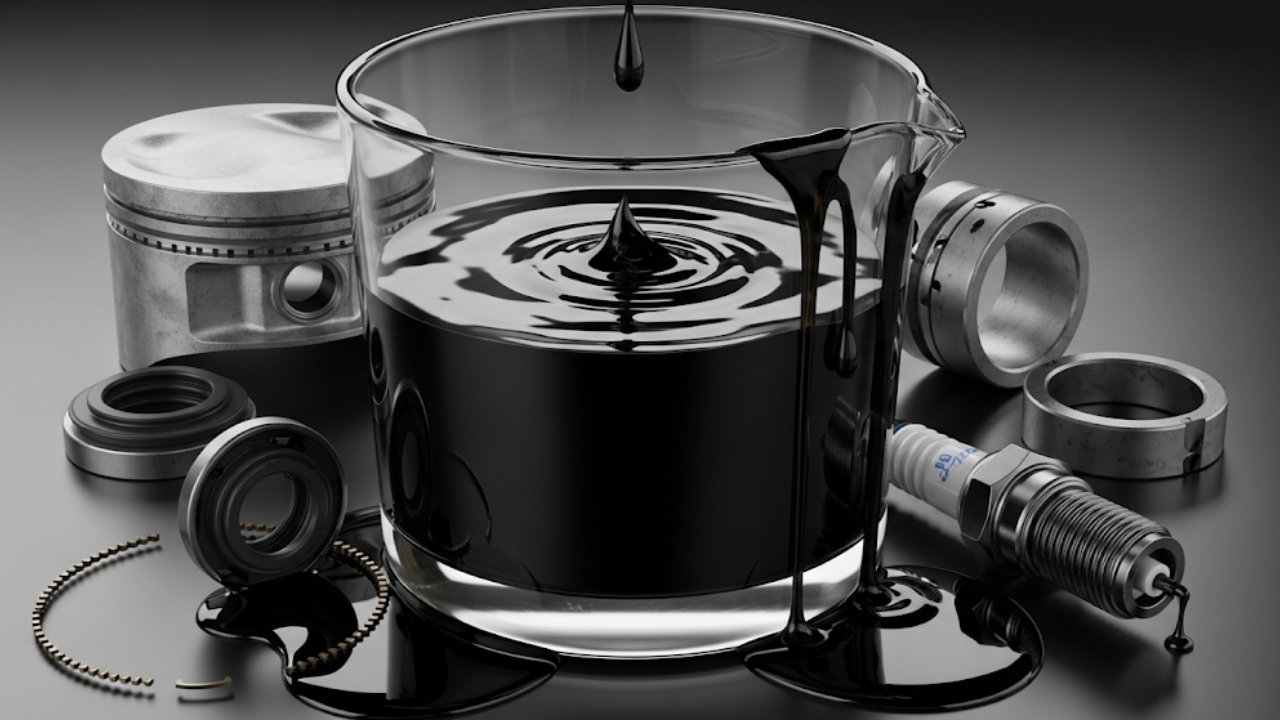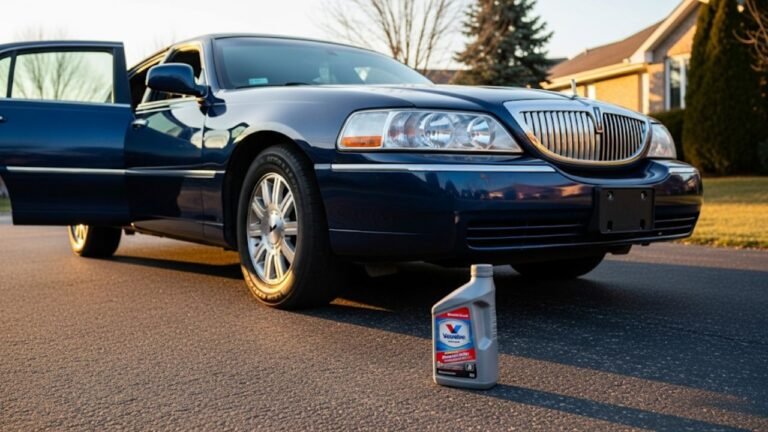Why Does Car Oil Turn Black?

So, you just checked your dipstick and noticed something weird. The oil that was once golden and smooth now looks thick, black, and kind of dirty. You might be thinking, “Why does car oil turn black so quickly?” Is it a bad sign? Should you panic and head to the mechanic?
Take a breath.
This is a question every car owner runs into sooner or later. It’s totally normal to feel a little confused. After all, black oil seems like it should mean something is wrong, right? But here’s the deal—black oil isn’t always bad oil.
In fact, car oil turning black is part of the job it’s supposed to do. Just like a sponge absorbs dirt, oil picks up all the gunk and particles your engine creates. That dark color tells a deeper story—about how your car works, what it’s been through, and how it’s protecting itself.
Let’s take a deep dive into this sticky subject together. I’ll walk you through the reasons, myths, facts, and tips—all in simple, relatable terms.
In This Article
- 1 What Is Motor Oil Supposed to Do?
- 2 Why Does Car Oil Turn Black? Here’s What’s Happening
- 3 How Fast Does Car Oil Turn Black?
- 4 Black Oil vs. Bad Oil: Big Difference
- 5 My First Time Seeing Black Oil (A Personal Story)
- 6 When Should You Worry About Black Oil?
- 7 Can Synthetic Oil Turn Black Too?
- 8 What Happens If You Ignore Black Oil for Too Long?
- 9 How to Know If It’s Time to Change the Oil
- 10 Tips to Keep Your Oil Cleaner for Longer
- 11 Common Mistakes People Make With Black Oil
- 12 Why Do Diesel Engines Turn Oil Black So Fast?
- 13 FAQs: Everything You’ve Wanted to Ask About Black Car Oil
- 13.1 1. Is black car oil dangerous for my engine?
- 13.2 2. Can I keep driving with black oil?
- 13.3 3. How long does it take for oil to turn black?
- 13.4 4. Should oil always stay golden?
- 13.5 5. What’s the best way to check my oil?
- 13.6 6. Does synthetic oil turn black too?
- 13.7 7. Can dirty oil affect fuel economy?
- 13.8 8. How do I know my oil filter is bad?
- 14 Conclusion: Black Oil Is a Sign—Not a Sentence
What Is Motor Oil Supposed to Do?

Imagine your engine like a group of metal dancers spinning around in a hot room. They’re moving fast, they’re creating friction, and they’re heating up. That’s where oil comes in—it’s the cooler, the cushion, and the cleaner.
Here’s what your car oil does:
-
Lubricates moving parts so they don’t grind together.
-
Reduces engine heat by carrying it away from hot spots.
-
Collects dirt and combustion byproducts, keeping them out of the way.
-
Prevents corrosion by coating metal parts.
Now, as your oil moves around doing all that work, it naturally collects grime—just like a kitchen sponge gets darker the more you use it. And that’s when the color starts to change.
Why Does Car Oil Turn Black? Here’s What’s Happening
Let’s get straight to it: Why does car oil turn black?
There’s no one-sentence answer, but here are the main reasons:
1. Carbon Buildup from Combustion
When fuel burns inside your engine, it creates carbon. Think of this like the black soot left over in a barbecue grill. That carbon doesn’t just disappear—it gets into your oil.
Over time, your oil turns from golden brown to coffee black.
2. Heat Oxidation
Engines get hot. And hot oil is like a frying pan—it oxidizes. That’s just a fancy word for breaking down when exposed to oxygen and heat. This chemical reaction darkens the oil and reduces its life.
3. Metal Particles and Wear
Tiny fragments of metal wear off engine parts during use. These microscopic bits float in the oil, darkening it. You won’t feel them, but they’re there.
4. Additives at Work
Modern oils have detergents and dispersants—chemicals added to clean your engine as it runs. These additives pick up sludge and hold it in the oil, changing the color to dark brown or black.
How Fast Does Car Oil Turn Black?
It really depends on your car, driving habits, and even the weather. But here’s a rough idea:
| Condition | Oil Color Change Speed |
|---|---|
| New engine, mostly highway driving | Slower |
| Old engine, lots of short trips | Faster |
| Diesel engines | Very fast |
| Turbocharged or high-performance | Moderate to fast |
Some people see black oil after just a few hundred miles. Others stay golden for a few thousand. But color isn’t the only factor that tells you when it’s time to change it.
Black Oil vs. Bad Oil: Big Difference
Here’s something important: black doesn’t mean bad.
Let me say that again, because it’s one of the biggest car myths out there.
Just because your oil is dark doesn’t mean it’s not doing its job. In fact, if your oil didn’t change color, that would be a problem—it means it’s not picking up debris and cleaning your engine.
So how do you know when oil is actually bad?
Look for these signs:
-
Oil feels gritty instead of smooth.
-
Engine starts running hotter than usual.
-
Oil level drops unusually fast.
-
You hear knocking or ticking sounds.
-
You’ve hit the recommended mileage limit.
Color is just part of the picture. Trust your maintenance schedule and the feel of the oil too.
My First Time Seeing Black Oil (A Personal Story)
I remember the first time I saw black oil on the dipstick. It was back in college. I had a little blue Honda Civic—a hand-me-down from my older brother—and I was super proud of it.
One day I popped the hood to impress my date. (Bad move. Don’t do this unless you know what’s going on under there.)
I pulled out the dipstick and froze. The oil was dark as midnight. I panicked. I thought the engine was dying.
My date said, “That’s normal, silly.” Turns out, her dad was a mechanic, and she’d helped him change oil since she was 10.
She was right.
I drove that car another 50,000 miles before selling it—and the oil turned black every time in between. But I stuck to the change schedule, and the engine stayed healthy.
When Should You Worry About Black Oil?
Let’s break this down clearly. Here’s when black oil is normal, and when it’s not.
✅ Normal:
-
After a few hundred miles on fresh oil.
-
On diesel engines (oil darkens super quickly).
-
After using synthetic oils with cleaning agents.
-
If the oil is dark but feels smooth between your fingers.
⚠️ Not Normal:
-
Black oil AND gritty texture.
-
Strong burnt smell.
-
Smoke from the engine or exhaust.
-
Consistently low oil levels even after topping up.
If any of these red flags show up, it’s worth getting your engine checked. Otherwise, black oil is just doing its job.
Can Synthetic Oil Turn Black Too?
Absolutely. Synthetic oil might be high-tech, but it’s not immune to getting dirty. In fact, it might get black even faster because it has more active cleaning agents. That’s not a flaw—it’s a feature.
Synthetic oil:
-
Cleans better.
-
Lasts longer.
-
Handles heat more efficiently.
But it still turns black once it starts collecting all the stuff you don’t want floating around in your engine.
What Happens If You Ignore Black Oil for Too Long?
Think of oil like your car’s lifeblood. When it’s fresh, it flows freely and keeps everything humming. But if you ignore black oil and don’t change it when needed, things can spiral fast.
Here’s what can happen:
-
Sludge builds up and clogs narrow oil passages.
-
Friction increases, causing engine parts to wear faster.
-
The engine runs hotter, risking overheating.
-
Oil loses its viscosity, becoming too thin or too thick to work right.
-
You could face a complete engine seizure—an expensive nightmare.
Once, a friend of mine went 18,000 km without an oil change. His Toyota started making a ticking sound. Then came the engine light. The mechanic found thick black sludge instead of oil. It cost him almost as much as the car was worth to fix it.
Lesson learned—black oil isn’t the villain, but neglecting it is.
How to Know If It’s Time to Change the Oil
So, the oil’s black. Now what?
Don’t rush to the mechanic just yet. Use these smart, simple checks before deciding:
Check the Texture
Rub a drop of oil between your fingers. It should feel smooth. If it feels gritty or sandy, it’s time.
Smell the Oil
Burnt-smelling oil? That’s a sign it’s broken down from too much heat and needs replacing.
Mileage Check
Most cars need oil changes every 3,000 to 7,000 miles (5,000–10,000 km). Check your owner’s manual.
Dashboard Light
If your oil pressure light comes on, stop and check the level. It could mean you’re running dangerously low.
Color Isn’t Everything
Yes, black oil looks dirty—but as we’ve said, that doesn’t mean it’s useless. Combine color with texture and time to make a smart call.
Tips to Keep Your Oil Cleaner for Longer
You can’t stop oil from turning black. But you can slow down how fast it happens.
Here are some practical tricks:
-
✅ Use high-quality synthetic oil – lasts longer and cleans better.
-
✅ Stick to your oil change schedule – don’t wait until something breaks.
-
✅ Change the oil filter every time – a dirty filter contaminates fresh oil fast.
-
✅ Avoid short trips – engines don’t heat up enough to burn off moisture and fuel residue.
-
✅ Warm up your engine gently – flooring it right after starting causes wear and oil contamination.
And don’t forget—regular maintenance is cheaper than engine repairs.
Common Mistakes People Make With Black Oil
Let’s be real. We’ve all messed up at some point. Here are the big ones to avoid:
❌ Judging Oil by Color Alone
Some folks panic when they see dark oil, thinking their car’s about to explode. That’s not true. Use other indicators too.
❌ Topping Up Instead of Changing
If your oil’s black and old, don’t just top it off. That’s like adding clean water to a dirty mop bucket. You’re not solving the problem.
❌ Skipping the Filter
Your filter catches the big stuff—metal bits, sludge chunks, and more. Replacing only the oil and leaving a dirty filter? That’s like wearing clean socks in muddy boots.
❌ Waiting for the Light
If your oil light comes on, you’ve waited too long. That light is your car screaming for help. Change oil before it gets to that point.
Why Do Diesel Engines Turn Oil Black So Fast?
Diesel car owners often freak out when their oil turns black after just a few hundred kilometers. But here’s the truth:
That’s completely normal for diesels.
Why?
-
Diesel fuel burns dirtier than gasoline.
-
More soot and carbon is produced during combustion.
-
The oil is designed to suspend and trap that soot—turning it black.
Unless the oil is gritty, smells burnt, or you’ve driven past the recommended limit, black oil in a diesel isn’t a sign of trouble.
FAQs: Everything You’ve Wanted to Ask About Black Car Oil
1. Is black car oil dangerous for my engine?
Not necessarily. It shows your oil is doing its job—absorbing dirt and carbon. But don’t ignore change intervals.
2. Can I keep driving with black oil?
Yes, if it’s still within your change schedule and feels smooth. But change it if it’s gritty or smells burnt.
3. How long does it take for oil to turn black?
Sometimes just a few hundred miles, especially with older engines or diesel vehicles.
4. Should oil always stay golden?
Nope. Clean-looking oil isn’t always better. If it’s not darkening, it might not be cleaning properly.
5. What’s the best way to check my oil?
Check when the engine is cool. Pull the dipstick, wipe it, insert it again, and then check color, texture, and level.
6. Does synthetic oil turn black too?
Yes, and sometimes faster. It contains additives that clean better, which leads to quicker darkening.
7. Can dirty oil affect fuel economy?
Absolutely. Dirty oil causes friction, making your engine work harder—and burn more fuel.
8. How do I know my oil filter is bad?
If your new oil turns black immediately, your filter might be clogged and recirculating gunk.
Conclusion: Black Oil Is a Sign—Not a Sentence
So, why does car oil turn black?
It’s a natural part of your engine’s rhythm. Like a kitchen sponge that gets darker with use, your oil darkens because it’s cleaning, protecting, and doing the heavy lifting inside your engine.
Don’t fear the dark.
Use it as a cue to stay in sync with your car’s needs. Combine color, texture, and mileage to make smart oil decisions.
And remember—regular oil changes are one of the cheapest ways to keep your car running smoothly for years.
Next time you see black oil, don’t panic. Smile. It means your oil is fighting the good fight inside that engine.






